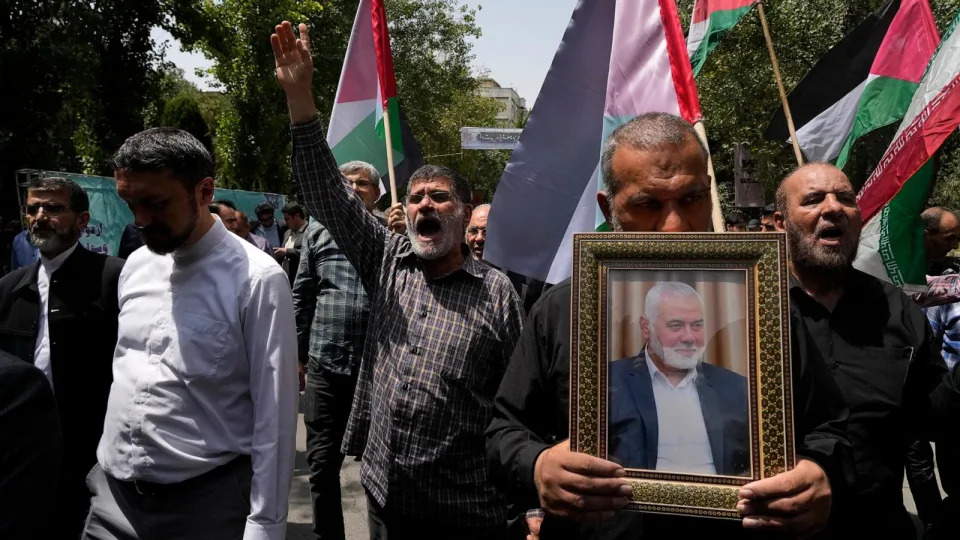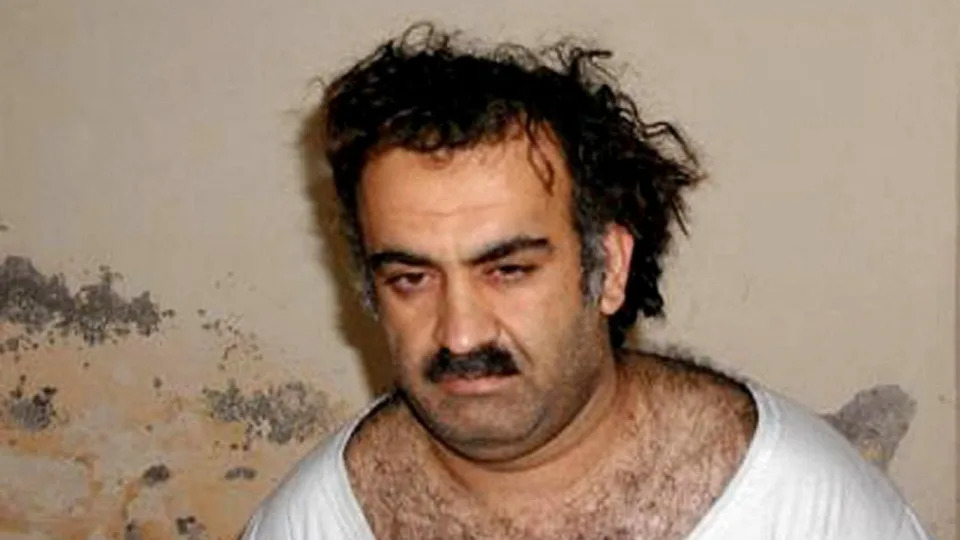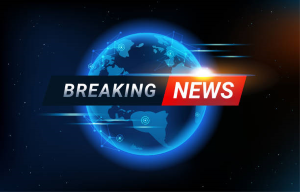The leaders of two different Iranian-backed groups, Hamas and Hezbollah, were killed in separate attacks within 24 hours of each other this week.
Hamas said its political leader, Ismail Haniyeh, was killed in an airstrike Wednesday in Tehran, where he had traveled to attend the inauguration of Iran’s president. On Tuesday, senior Hezbollah commander Fuad Shukr was killed in an Israeli strike in the outskirts of Beirut.
In response to the killing of Haniyeh, Iran’s supreme leader, Ayatollah Ali Khamenei, ordered a direct strike on Israel, the New York Times reported.
Hamas, the militant government Palestinians elected in Gaza, orchestrated an unprecedented attack on Israel on Oct. 7 that killed nearly 1,200 people and resulted in Israel’s military response that has killed more than 39,000, according to Palestinian health authorities. For decades, Hezbollah, a heavily armed militia group based in Lebanon, has launched rockets into Israel. Both groups are backed by Iran.
Now, fears of wider Middle East conflict are growing. The U.S. State Department released an advisory Wednesday warning Americans not to travel to Lebanon “due to rising tensions between [Hezbollah] and Israel.”
Here’s what we know about what has happened in the Middle East:
The apparent assassination of Hamas political leader
-
Haniyeh was primarily living in Qatar, where he played a key part in the ongoing indirect Israel-Hamas ceasefire negotiations that have been brokered by Qatar, Egypt and the U.S.
-
Haniyeh was killed by a rocket strike in the early morning hours on Wednesday in an apparent assassination at his residence in Tehran after he attended a swearing-in ceremony for the new Iranian president, according to Hamas.
-
Haniyeh’s funeral will be held in Qatar. Hamas’s main consultative council will likely meet soon after the funeral to name a replacement, the Associated Press reported.
-
Hamas and Iran quickly blamed Haniyeh’s death on Israel, which had previously vowed to kill Haniyeh and other Hamas leaders in retaliation for the Oct. 7 attack.
Israel has not denied or claimed responsibility for Haniyeh’s death
-
As of Wednesday afternoon, Israel had not confirmed nor denied responsibility for the killing of Haniyeh.
-
Israeli Prime Minister Benjamin Netanyahu delivered an address to his nation Wednesday and said, “We’ll settle the score with anyone who harms us, anyone who massacres our children, anyone who murders our citizens, anyone who hurts our nation, blood is on his head.” Netanyahu did not specifically mention Haniyeh by name, however.
-
Israeli Defense Minister Yoav Gallant said that Israel was not trying to escalate a wider regional war, but that it was prepared for all scenarios.
Iran vows ‘harsh punishment’
-
Iran's Khamenei said Israel paved the way for "harsh punishment for itself," adding that it’s Tehran's responsibility to avenge Haniyeh's death.
-
Iran’s foreign ministry also condemned the White House’s backing of Israel, accusing it as “as a supporter and accomplice of the Zionist regime in the continuation of the occupation and genocide of the Palestinians, in committing this heinous act of terrorism.”
U.S. denies involvement in the killing of Haniyeh
-
White House national security spokesperson John Kirby told reporters Wednesday that the U.S. “can’t confirm or verify” that Haniyeh was killed in an Israeli strike.
-
U.S. Secretary of State Antony Blinken said at a Wednesday event in Singapore that the United States was “not aware of or involved in” the killing of Haniyeh.
-
Blinken added that the focus remains on continuing to work toward reaching a ceasefire “to help end the suffering of Palestinians in Gaza” and to get the Hamas-held hostages home, which include “a number of Americans.”
Israel killed Hezbollah commander hours before Hamas political leader assassinated
-
Israel did claim responsibility for an airstrike that killed Hezbollah commander Shukr in Beirut on Tuesday.
-
That strike came after Israel blamed Hezbollah for an attack that killed 12 children and teenagers in the Israeli-controlled Golan Heights over the weekend.
-
Hezbollah denied responsibility for the Golan Heights attack.
-
The U.S. stood by Israel following the attack that killed Shukr. “What we know, in particular, is it has the right to defend itself against the terrorist organization, which is exactly what Hezbollah is,” Vice President Kamala Harris said Tuesday.
AfriPrime App link: FREE to download...
https://www.amazon.com/Africircle-AfriPrime/dp/B0D2M3F2JT
Netanyahu vows Israel's war in Gaza will continue until 'total victory.' Takeaways from his address to Congress.
Israeli Prime Minister Benjamin Netanyahu spoke to Congress for nearly an hour on Wednesday.
Israeli Prime Minister Benjamin Netanyahu addressed a joint session of Congress on Wednesday and defended Israel’s military offensive against Hamas in Gaza.
He noted that it was his fourth time ever to address Congress. But it was his first time to do so since the Oct. 7 deadly Hamas attack on Israel, when the militant group killed about 1,200 people and kidnapped about 250 others.
One of the since rescued Israeli hostages, Noa Argamani, was a guest of Netanyahu’s who, along with several members of the Israel Defense Forces, was given a standing ovation from Congress, .
Netanyahu vowed to press on with the war until “total victory” as the Palestinian death toll approaches 40,000 since the start of the Israel-Hamas war, according to Gaza’s Hamas-run health ministry. The war-torn enclave also faces a catastrophic humanitarian situation in Gaza.
As Netanyahu delivered remarks in the House chamber, thousands of pro-Palestinian demonstrators descended on Capitol Hill to protest the prime minister’s handling of the Israel-Hamas war. Dozens of Democratic lawmakers also boycotted Netanyahu’s speech for those similar reasons.
During his nearly hour-long speech, Netanyahu did not make mention of any ceasefire negotiations. Here are some of the other key takeaways from his address.
Addressed alleged war crimes accusations
Back in May, the chief prosecutor of the International Criminal Court announced he was seeking arrest warrants for Netanyahu and Hamas leader Yahya Sinwar in Gaza on charges of war crimes and crimes against humanity.
"The prosecutor of the International Criminal Court has shamefully accused Israel of deliberately starving the people of Gaza. This is utter, complete nonsense. It's a complete fabrication," Netanyahu said during his address.
He claimed that Israel has “enabled more than 40,000 aid trucks to enter Gaza,” and denied reports that Israel has blocked aid from entering, and rather accused Hamas of stealing it.
According to a recent United Nations report, 96% of the population of Gaza is “projected to face crisis or worse levels of food insecurity.”
The U.S. has repeatedly urged Israel to allow for more humanitarian aid into Gaza.
Netanyahu also issued a stark warning, claiming, “The ICC is trying to shackle Israel’s hands and prevent us from defending ourselves. And if Israel’s hands are tied, America is next.”
Netanyahu urged U.S. to expedite military aid
Netanyahu told Congress that if the U.S. fast-tracks military aid to Israel, it can “dramatically expedite an end to the war in Gaza and help prevent a broader war in the Middle East.”
The Israeli prime minister invoked the words of British Prime Minister Winston Churchill, who asked for the U.S.’s help during World War II when he said, “Give us the tools, and we’ll finish the job.”
He added, “I, too, appeal to America: Give us the tools faster, and we’ll finish the job faster.”
Slammed pro-Palestinian demonstrators
Netanyahu called the pro-Palestinian demonstrators outside the Capitol building “Iran’s useful idiots” and said, “For all we know, Iran is funding the anti-Israel protests that are going on right now, outside this building.”
He also claimed that they “choose to stand with evil” and “should be ashamed of themselves.”
Netanyahu thanked Biden — and Trump
Netanyahu thanked President Biden for his “heartfelt support for Israel,” acknowledging the two aircraft carriers dispatched to the Middle East to deter a wider regional war.
“He came to Israel to stand with us during our darkest hour, a visit that will never be forgotten,” Netanyahu said, thanking Biden for his “tireless efforts” to secure the release of the hostages that were kidnapped by Hamas on Oct. 7.
Netanyahu also expressed gratitude for all the things former President Donald Trump did for Israel during his White House tenure, including “recognizing Israel’s sovereignty over the Golan Heights to confronting Iran’s aggression, to recognizing Jerusalem as our capital and moving the American Embassy there,” he said.
Netanyahu added that “Israelis were relieved” Trump survived an assassination attempt on July 13.
Says the Israel-Hamas war will continue
Toward the end of his speech, Netanyahu reiterated his stance that Israel would continue the war "until we destroy Hamas's military capabilities and its rule in Gaza and bring all our hostages home."
Netanyahu said that, in a post-Hamas future, Israel has no interest in resettling Gaza, but will "retain overriding security control" to keep Hamas (or another militant group) from re-forming.
"My vision for the day is of a demilitarized and de-radicalized Gaza," he said. "We will settle for nothing less."
What’s next?
Kamala Harris, who, as vice president serves as president of the Senate, did not attend Netanyahu’s address. She and Biden are expected to meet with him separately on Thursday, while the prime minister will meet with Trump at Mar-a-Lago on Friday.
AfriPrime App link: FREE to download...
https://www.amazon.com/Africircle-AfriPrime/dp/B0D2M3F2JT
The Tehran assassination has changed the game:
The assassination of Ismail Haniyeh has the entire Middle East on an absolute knife’s edge.
When we wrapped up our ABC News coverage on Tuesday night, Israel had just announced they had killed a senior Hezbollah leader in Beirut, their targeted response to the Golan Heights rocket attack.
The question was when and how Hezbollah would respond, but the overriding sense was that both sides were likely to find a way not to escalate to all-out war.
That’s now been completely upended.
An attack in Tehran, the heart of Iran, killed the political leader of Hamas not long after he attended the inauguration of Iran’s new president at the invitation of the country’s supreme leader. Haniyeh was in their care. This is a huge deal.
Israel hasn’t taken direct responsibility, but Iran’s supreme leader has said the attack came from the “criminal and terrorist Zionist entity.”
“With this act, [Israel] paved the way for a severe punishment, and we consider it our duty to avenge the blood of those who were martyred in the Islamic Republic of Iran,” said Ayatollah Khamenei.
But just what that response looks like and when it comes is anyone’s guess.

It could be another missile or drone attack from Iran like we saw a few months ago. It could be Iran hitting Israeli targets abroad. We know security is being stepped up at Israeli embassies worldwide. It could be both options, neither or something else entirely.
Does the Iranian response preclude a response from Hezbollah? Their leadership had promised to target Tel Aviv if Beirut was hit. Well, a Beirut suburb got hit. A salvo from Iran could be joined by a salvo from southern Lebanon. Hezbollah does as Tehran instructs.
For its part, Hamas has also vowed to respond, saying the attack won’t go unanswered and will only serve to prolong the conflict.
Israel Defense Forces has stepped up its security posture throughout the country, closing airspace within 50 miles of the border.
It’s worth noting that both the Beirut and Tehran attacks by Israel were targeted -- limited civilian casualties and what the IDF says were legitimate military targets.
There is uniform opinion from most Israeli analysts, including those ABC News has spoken to personally, that Iran isn’t going to go to war over the killing of a Hamas leader. They didn’t after Soleimani was killed after all. After all, they didn’t after the commander of Iran’s Revolutionary Guard’s elite Quds Force, Qassem Soleimani, was killed in a U.S. strike and Soleimani was far more important to Iran than Haniyeh.
But this was a strike right in their backyard at a time when they are trying to project strength throughout the region. It’s not only embarrassing, it’s also a security lapse that has caught them flat-footed.
Accordingly, their response could be severe, even if not intended to cause all-out war. But just because you mean for a response to be targeted and limited doesn’t mean something won’t go wrong or that the other side will see it that way.
So continues this extremely dangerous back-and-forth game between Israel and its enemies. It’s been kept in check so far, but few are sleeping easy in Tel Aviv right now.
AfriPrime App link: FREE to download...
https://www.amazon.com/Africircle-AfriPrime/dp/B0D2M3F2JT
9/11 alleged mastermind Khalid Sheikh Mohammed and 2 others reach plea deal
Three of the five 9/11 defendants at Guantanamo Bay -- including alleged mastermind Khalid Sheikh Mohammed -- have reached a plea agreement with prosecutors, the Department of Defense announced Wednesday.
Gary B. Sowards, the lead attorney Mohammed, confirmed to ABC News on Wednesday evening that the agreement does not include the death penalty but means his client will essentially serve life in prison.
The trial of the five 9/11 conspirators had been stuck in legal delays for a very long time. No details about the specific terms and conditions of the pre-trial agreement were made public by the DOD. The other two conspirators who have agreed to the agreement aside from Mohammed are Walid Muhammad Salih Mubarak Bin Attash and Mustafa Ahmed Adam al Hawsawi.
Patrick White, cousin of Louis Nacke II who was a passenger on United 93 -- the flight where passengers attempted to retake the plane from hijackers, and in the struggle, the aircraft crashed in a field in Pennsylvania -- told ABC News, "I've made my peace with it."
He added that he believes "life in prison along with an admission of guilt that they were complicit in [the] murder of loved ones" was what he was hoping would result from the plea talks.
A White House National Security Council spokesperson told ABC News that the White House learned that the Convening Authority for Military Commissions entered into pretrial agreements with Mohammed and the other two 9/11 defendants on Wednesday.
The spokesperson also said that the president and White House played no role in the process.
Two other 9/11 defendants did not participate in the trial agreement, though only one of them, Ammar al Baluchi, could actually face trial proceedings at Guantanamo.
Last September a military judge ruled that the Ramzi bin al Shibh, the other defendant not participating in the plea agreement, was mentally incompetent to stand trial.
In a statement about the plea agreement, Brett Eagleson, president of 9/11 Justice, said, "We are deeply troubled by these plea deals."
He added that the group acknowledged the decision to avoid the death penalty but wants more access "to these individuals for information."
"These plea deals should not perpetuate a system of closed-door agreements, where crucial information is hidden without giving the families of the victims the chance to learn the full truth," he said.
The ACLU issued a statement saying the DOD's decision was the "right call."
"The government's decision to settle for life imprisonment instead of seeking the death penalty in the case of Khalid Shaikh Mohammed is the right call," Anthony D. Romero, executive director of the ACLU, said in a statement. "It's also the only practical solution after nearly two decades of litigation. For too long, the U.S. has repeatedly defended its use of torture and unconstitutional military tribunals at Guantánamo Bay. The military commissions were doomed from the start and the government’s torture of these defendants makes this plea both necessary and just. Finally, closing the chapter on these cases with a plea agreement will also provide a measure of transparency and justice for 9/11 family members."

Last September, ABC News reported that President Joe Biden rejected a set of demands to form a basis for plea negotiations offered by the five defendants.
Biden agreed with U.S. Secretary of Defense Lloyd Austin's recommendation not to accept their demands, known as "joint policy principles," that they wanted prior to entering into plea agreement talks with prosecutors. According to the New York Times, those demands included avoiding solitary confinement and receiving health treatment for injuries the detainees claim were a result of CIA interrogation methods when they were in the CIA’s "black prisons."
"The 9/11 attacks were the single worst assault on the United States since Pearl Harbor," a National Security Council spokesperson told ABC News in a statement in September 2023. "The President does not believe that accepting the joint policy principles as a basis for a pre-trial agreement would be appropriate in these circumstances. The Administration is committed to ensuring that the military commissions process is fair and delivers justice to the victims, survivors, families, and those accused of crimes."
The five detainees were transferred to the U.S. detention center in Guantanamo Bay, Cuba, in 2006. Their case has been held up by legal proceedings for years, with no trial date set.
On the morning of Sept. 11, 2001, two hijacked passenger jets flew into the Twin Towers of the World Trade Center in New York City, marking the start of a series of coordinated attacks that day against the United States by the Afghanistan-based terrorist group al-Qaida. Nearly 3,000 people were killed that day and thousands more were injured.
AfriPrime App link: FREE to download...


